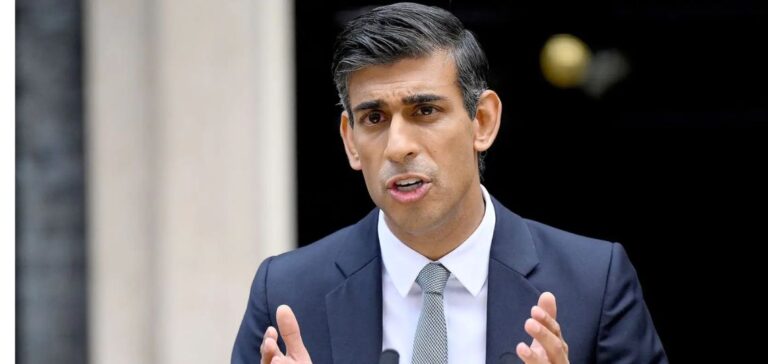British Prime Minister Rishi Sunak announced on Wednesday that he would attend COP27 after all, an about-face that was better received in substance than in form for the Conservative leader, who already has several irons in the fire on the home front.
“There is no long-term prosperity without action on climate change. There is no energy security without investing in renewables. That’s why I’ll be attending @COP27 next week: to ensure Glasgow’s legacy is translated into a secure and sustainable future,” tweeted the 42-year-old Conservative leader.
Rishi Sunak, whose country hosted COP26 last year, initially said he would not attend the climate conference, justifying his absence by “pressing commitments” in the UK.
At the forefront is the preparation of the budget presentation on November 17, highly anticipated after several weeks of financial storm, caused by the economic announcements of his predecessor Liz Truss, who stayed in office only 49 days.
Rishi Sunak is also shaken by his controversial choice to reappoint the very right-wing Suella Braverman as head of the Ministry of the Interior, just six days after she resigned – under Liz Truss – for improperly sharing official documents from a private email address.
In addition, there is the delicate matter of managing the massive influx of migrants crossing the English Channel in small boats, which is beyond the capacity of the British government, which anticipates a total of 50,000 arrivals over the year 2022.
“Embarrassing misstep”
During the weekly question session in Parliament, his second since coming to power, Rishi Sunak defended his minister, whose departure the opposition is demanding: “she is doing her job, tackling crime, defending our borders.
The absence of the new British leader at COP27, where Joe Biden and Brazilian President-elect Luiz Inacio Lula da Silva are expected to attend, appeared all the more politically embarrassing as former Prime Minister Boris Johnson had confirmed on Tuesday that he would attend.
After an accumulation of criticisms, notably from the British climate negotiator Alok Sharma, Downing Street seemed to be gradually preparing the ground for a reversal.
“Good decision. We all need UK leadership on climate,” Irish Foreign Minister Simon Coveney reacted on Twitter.
“Happy” with this about-face, the green deputy Caroline Lucas criticized “an embarrassing faux-pas on the world stage”. “Let this be a lesson to him,” she tweeted.
The leader of Labour Keir Starmer said that “giving in to criticism is not leading”.
The king will not go
“If the UK wants to be seen as a leader in the world, it must lead the way. It is the least the Prime Minister can do to go to COP27″, reacted Tracy Carty, head of climate at the NGO Oxfam GB.
Despite the Prime Minister’s reversal, King Charles III, known for his long-standing commitment to the environment, will not attend.
There is “unanimous agreement” with the government, a Buckingham Palace spokesman said.
It was only last Friday that Downing Street publicly admitted that the King would not be attending, several days after press reports that Liz Truss had objected to the King’s participation.
“As is the practice, the advice of the government was sought and provided under a previous prime minister and it was unanimously agreed that this would not be the right occasion for King Charles to visit in person,” a spokeswoman for the prime minister had said.
The king is hosting a reception at Buckingham Palace this Friday, bringing together 200 business leaders, policymakers and NGOs “to mark the end of the UK’s COP26 presidency and look ahead to the COP27″ summit, according to his office. The American special envoy for the climate, John Kerry, is expected to attend.






















